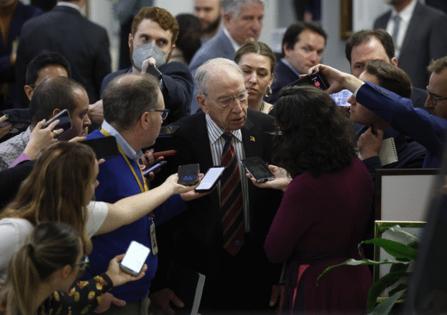COUNTERPOINT: Reporters shouldn't have more First Amendment rights than the rest of us
Published in Op Eds
Do reporters have more rights under the First Amendment than ordinary Americans? Should they?
The answer to both questions is “no.” Unfortunately, a bill passed by the House of Representatives and is sitting in the Senate wants to change that.
The PRESS Act would allow the media to operate outside the law and withhold information vital to federal criminal investigations of serious crimes, including national security matters. The bill will expire on Jan. 3, as does all pending legislation, when the 118th Congress ends. Congress should think twice before considering it again.
No one questions the importance of a free press. It is essential to the healthy maintenance of a functioning democratic republic. There is a reason the First Amendment to the Constitution prohibits Congress from “abridging the freedom of speech, or of the press.”
Freedom is one thing. Impunity is another.
The members of the “press” aren’t given greater rights than citizens; both are equally entitled to freedom of speech. However, that freedom does not extend to covering up a crime or withholding evidence of a crime.
I have reported stories about abusive Department of Justice practices. Sometimes when I did, I personally ran the risk of Justice issuing a subpoena to me to testify about who my sources were. That’s the risk I took publishing the stories. That’s the risk any reporter takes: a grand jury may subpoena them if the leaks were illegal. You chose the profession; deal with it.
The PRESS Act would remove the risk. It would make reporters immune to investigations by federal law enforcement authorities, including grand juries. They would not have to disclose “any records, contents of a communication, documents, or information that a covered journalist obtained or created as part of engaging in journalism.”
The only exceptions would be information necessary “to prevent, or to identify any perpetrator of, an act of terrorism against the United States” or “to prevent a threat of imminent violence, significant bodily harm, or death, including specified offenses against a minor.”
Note the glaring loopholes in these exceptions. The terrorism exception is limited to the United States, so if a reporter obtains crucial information identifying the “perpetrator” of an act of terrorism against another country, such as an attack on Israel, he could not be forced to disclose that information. However, any other American obtaining such crucial information would not be shielded from the full force and power of federal law enforcement — and shouldn’t be. Neither should journalists.
There is also no national security exception. Any reporter having evidence about who leaked classified documents, such as the recent leak of Israel’s plan of attack on Iran, a violation of numerous federal laws, including the Espionage Act, could withhold that evidence from a criminal investigation. This hampers the ability of law enforcement to stop crimes that endanger our national security and the national security of a valued ally.
If reporters want to publish classified information, they should bear the risk of violating federal law. Let them shoulder the burden of the profession.
Did the supporters of this bill in the House understand the loophole they were creating with these inexplicable limitations that would endanger our national security and withhold vital information from our allies? Perhaps the fact that the bill was passed with a mere voice vote tells us that the answer is that they didn’t think much about it.
The second exception also shields reporters from having to disclose information about numerous crimes. The bill blithely refers to the “information” that a reporter may have, but what we are really talking about is evidence of a crime that a reporter may have.
Reporters will have to produce such evidence to, for example, a grand jury, only if there is a threat of imminent violence, significant bodily harm or death, or certain offenses against a minor. That means if the violence, injury and death have already occurred, yet a reporter has evidence showing who the criminal is who murdered, raped or assaulted someone, he or she cannot be compelled to reveal it. There is no exception for other serious crimes such as drug dealing, bank fraud or bribery.
With this shield law in place, a reporter could keep such evidence to himself.
Could a regular American escape the obligation of grand jury testimony? Only if we invoked the Fifth Amendment.
This law is not needed. In 1972, the Supreme Court held in Branzburg v. Hayes that reporters have no First Amendment privilege that shields them from being compelled to testify before a grand jury about evidence they have of a crime.
That has not stopped reporters, bloggers and citizens from investigating and publishing numerous stories about high crimes and misdemeanors, including those by government officials. That includes Watergate, the Pentagon Papers, Katie Pavlich’s groundbreaking work about Operation Fast & Furious, and the FBI cover-up over the Hunter Biden laptop.
A federal shield law for reporters would give the institutional press rights far beyond those of ordinary citizens — a fundamentally unfair and dangerous proposition. It would allow them to withhold vital evidence of crimes, government corruption and wrongdoings.
The First Amendment was never intended to produce such a result for good reason. And Congress should not either.
____
J. Christian Adams is a commissioner on the U.S. Commission on Civil Rights, the president of the Public Interest Legal Foundation and a former Justice Department attorney. He wrote this for InsideSources.com.
___
©2024 Tribune Content Agency, LLC




























































Comments